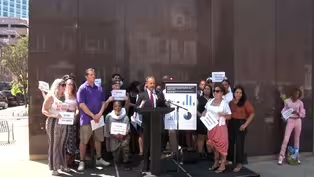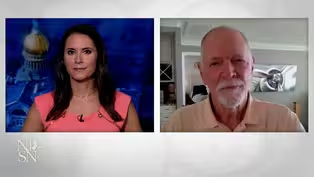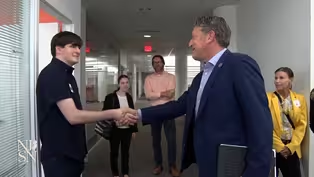NJ Spotlight News
Worries about Trump order targeting homeless
Clip: 7/31/2025 | 5m 3sVideo has Closed Captions
Interview: Richard Uniacke, president of Bridges Outreach
Every year, the state conducts a point-in-time count -- essentially a one-day snapshot -- of the number of homeless people in New Jersey. NJ Spotlight News spoke with Richard Uniacke, president of Bridges Outreach, an advocacy group, about the latest count and concerns over President Trump's recent executive order.
Problems playing video? | Closed Captioning Feedback
Problems playing video? | Closed Captioning Feedback
NJ Spotlight News is a local public television program presented by THIRTEEN PBS
NJ Spotlight News
Worries about Trump order targeting homeless
Clip: 7/31/2025 | 5m 3sVideo has Closed Captions
Every year, the state conducts a point-in-time count -- essentially a one-day snapshot -- of the number of homeless people in New Jersey. NJ Spotlight News spoke with Richard Uniacke, president of Bridges Outreach, an advocacy group, about the latest count and concerns over President Trump's recent executive order.
Problems playing video? | Closed Captioning Feedback
How to Watch NJ Spotlight News
NJ Spotlight News is available to stream on pbs.org and the free PBS App, available on iPhone, Apple TV, Android TV, Android smartphones, Amazon Fire TV, Amazon Fire Tablet, Roku, Samsung Smart TV, and Vizio.
Providing Support for PBS.org
Learn Moreabout PBS online sponsorshipEvery year, the state conducts a point-in-time count, which is really a one-day snapshot of the number of homeless people in our state.
Those numbers help lawmakers and housing support organizations better understand just how vast the issue actually is, and it is vast.
This year, there was an 8 percent increase in the number of homeless people compared to 2024.
That's about 400 on any given day.
Well, last week, President Trump addressed the issue with an executive order instructing law enforcement to arrest or institutionalize homeless people dealing with substance use or mental health disorders and to end programs that focus on housing first, calling them a failure.
Rich Uniak is the president of Bridges Outreach that works to connect the unhoused in Essex and Union counties with affordable housing.
He's here now to talk through the numbers and the latest in the federal guidance.
Rich, so great to have you here in the studio with us.
We do see a pretty stark increase in the number of homeless and unsheltered people that came out of the point-in-time count.
Do you understand why we're seeing these stark increases?
Oh, absolutely.
Thank you, Joanna.
Yeah, I mean, it's an affordable housing crisis and fewer resources to prevent homelessness.
Rents keep going up.
There was a recent study showing that New Jersey is the seventh least affordable state in the nation, and to afford a two-bedroom apartment, you have to make $90,000 a year.
There are a lot of people who fall into a category where their housing is not going to be stable, and that's really what we're seeing, is a flood of people whose living situation becomes untenable or they can't afford the rent.
We've also seen an executive order that just came from the Trump administration that's really pointing to folks who are homeless or unsheltered as a result of mental health issues or substance use challenges.
Unpack that a little bit for us in terms of what you see out on the street and this approach to really criminalize that behavior.
And that's really what it is.
It's criminalization.
It's dehumanization.
It's painting everyone with a broad brush as though it's all mental illness or substance use disorder.
In the seven years I've been with Bridges Outreach, more often than not, I've seen mental illness come about from the trauma of experiencing homelessness, not driving people into homelessness.
The top causes are still in New Jersey and across the country, eviction and being asked to leave a shared residence, breakup of a household.
So when you force people into institutional settings, when you basically criminalize anyone for the experience of homelessness and the biological imperative to sleep, you're really doing everybody a disservice.
And regardless of whether you think that it's inhumane and it's not the right thing to do, I guess one of the bigger problems with it is that it's so incredibly expensive to treat it this way.
I mean, the fair market rate for a two bedroom apartment in Essex County, where we are right now, is going to come out to just over $25,000 a year.
To institutionalize someone in a prison in New Jersey is $60,000 a year.
For a more specialized institutional setting, it's in excess of $100,000 a year.
So economically, this doesn't make sense.
It doesn't make any sense.
At Greystone, it was $1,000 a day.
So why are we wanting to push people into these institutional settings?
It's not fiscally responsible and it's inhumane.
Let me ask you this, because right before we went on the air, you talked to me about the percentage of increase that you saw that was actually significantly more than the point in time numbers showed.
Oh, yeah.
Oh, and that's important, right?
The point in time count is an important snapshot and it's really just that.
It's a point in time.
Our team does street outreach in Newark 24/7, 365.
So we're documenting every encounter.
The point in time count showed 107 unsheltered people in Newark.
Through the first six months of the year, we've encountered more than 1,800, 17 times that number.
It's important that we look at the truer measure as we think about what the community needs.
So then, Rich, is it fair criticism for the Trump administration and others to say then that these programs aren't working, that they're not solving homelessness?
It's definitely not going to work, right?
We need housing.
We see that it's more cost-effective.
We see all the data show that Housing First makes that sustainability possible.
It makes the substance use treatment, the healthcare, the behavioral healthcare all much more possible and feasible.
The success rates spike like a hockey stick and we need affordable housing.
That's the bottom line.
We need the Affordable Housing Trust Fund.
With just the short amount of time that we have left, do you think that this executive order from the president will lead to more municipalities writing their own laws that allow the jailing, the institutionalization of people who are experiencing homelessness?
I'm afraid that it will.
And I believe that their hands are being forced.
There's just too much money at stake.
And that's really what I think they're counting on.
Thank you so much for the work that you're doing out there in the community and for highlighting it here with us.
Rich Uniak, president of Bridges Outreach.
Appreciate it.
Thank you, Joanna.
[Music]
Sexual abuse alleged at NJ juvenile detention centers
Video has Closed Captions
Clip: 8/1/2025 | 5m 2s | Over 350 lawsuits filed alleging abuse at state-run facilities (5m 2s)
Air traffic control changes behind Newark airport delays?
Video has Closed Captions
Clip: 7/31/2025 | 5m 26s | Interview: Randy Babbitt, former FAA administrator (5m 26s)
NJ bill aims at job training for 'neurodiverse' people
Video has Closed Captions
Clip: 7/31/2025 | 4m 23s | Legislation by state Sen. Andrew Zwicker offers tax credits for hiring in STEM roles (4m 23s)
Providing Support for PBS.org
Learn Moreabout PBS online sponsorship
- News and Public Affairs

Top journalists deliver compelling original analysis of the hour's headlines.

- News and Public Affairs

FRONTLINE is investigative journalism that questions, explains and changes our world.












Support for PBS provided by:
NJ Spotlight News is a local public television program presented by THIRTEEN PBS


